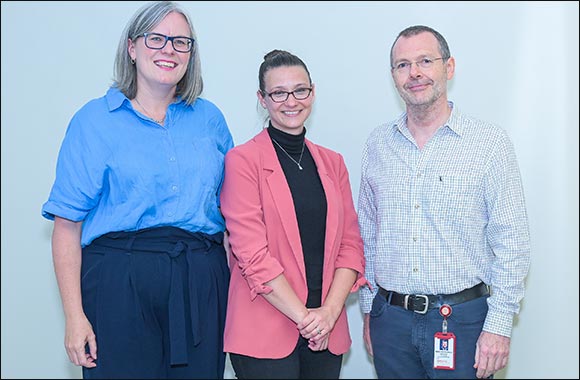
The Impact of Science Communication on Health Education and Public Engagement
Doha – November 2, 2022: The Health Sciences Library and Division of Continuing Professional Development (CPD) at Weill Cornell Medicine-Qatar (WCM-Q) held a two-day course to investigate how the art of communicating science impacts public engagement with health messages at both the individual and population levels.
Titled ‘Leveraging Science Communication Tools to Craft Effective Health Messages,’ the course was directed by Jamie Gray, associate librarian and director of health sciences library at WCM-Q, and was attended by allied health professionals, dentists, educators, nurses, pharmacists, health communicators and physicians.
The course faculty included Dr. Javaid Sheikh, dean of WCM-Q, Dr. Maya Adam, director of health media innovation and clinical assistant professor in the department of pediatrics at Stanford School of Medicine, Dr. Ross MacDonald, librarian of scholarly communications at WCM-Q, and Sinéad O'Rourke, engagement manager at WCM-Q.
Participants explored the basic principles of science communication, how science and health literacy impacts health behaviors and understanding of scientific evidence, the effects of misinformation and why it can be so tricky to combat, and how to effectively create evidence-informed health messages for different audiences and platforms.
In addition, the course also explored how the scientific process, human cognition, and various social factors contribute to the public’s willingness to engage in scientific discussions.
The objectives of the course were to define scientific communication, how it is impacted by science and health literacy, and where it can go wrong; how cognitive processes influence the ways in which information is received and internalized; techniques for developing and testing messages for different audiences; and how to create an online communication proposal tailored to a particular audience.
Summarizing her approach to health communication, Dr. Adam, said: “Effective health education needs to be accessible across cultures, languages, and education and literacy levels. Storytelling is a universal language that we can use to engage diverse audiences, communicate critical information, and help audiences retain what they have learned. Our responsibility – as scientists and healthcare providers – is to translate evidence-based health recommendations into formats that will reach people where they are. This means delivering accessible health media on the platforms where people seek information and delivering it in ways that appeal and make sense to them.”
Ms. Gray, said: “As the health information ecosystem evolves, it’s imperative that we think about the system holistically. Exploring scholarly, science and health communication as a continuum and how those domains intersect when it comes to our health decision-making is vital to finding the best avenues for empowering individuals and communities in their own wellbeing journeys. Information is power. But that information needs to be shared in a way that is meaningful and useful to people in their everyday lives.”
Dr. Sheikh, said: “As a medical education and research institution, there is an important scientific education element that we must always take into consideration as part of our overall role and responsibility. By effectively raising awareness and understanding of science-related topics, we are able to encourage science literacy and subsequently positively impact health behavior and engagement on an individual and community level.”
Dr. Thurayya Arayssi, vice dean for academic and curricular affairs, said: “We are committed to offering healthcare professionals an abundance of opportunities for continuing medical education and professional development. Our truly diverse range of workshops therefore not only touch on relevant medical education and research elements but also extend to other areas that positively contribute to the important work we do at WCM-Q.”
In Qatar, WCM-Q is accredited as a provider of continuing medical education by the Department of Healthcare Professions (DHP) of the Ministry of Public Health (MOPH) and is accredited internationally by the Accreditation Council for Continuing Medical Education (ACCME).
Home >> Healthcare and Fitness Section
Keeta Sets Stage for Qatar Market Entry with Exclusive Founding Vendor Program f ...
Passenger Growth Hits 5% in May
Nasser Bin Khaled Automobiles Hosts Private Screening of 'F1: The Movie' In coll ...
May Air Cargo Demand Up 2.2% Despite Trade Disruptions
Qatar Insurance Group Earns MSCI's Highest ESG Rating, Cementing Its Leadership ...
Zulal wellness resort partners with qatar airways privilege club to offer exclu ...
Education Above All Foundation Announces New Collaboration with the American Cha ...
Auto Class Cars Launches its Special Summer offer on Maxus D60 and D90 max SUVs
Qatar Automobiles Company – FUSO: Driving Progress Across Industries in Qatar
Dukhan Bank Ranks #62 on Forbes Middle East's Top 100 Listed Companies for 2025
Nissan hosts world premiere of all-new Patrol NISMO in the Middle East, elevatin ...
The Mitsubishi Montero Sport.. Attractive design, High Performance and Durable
Hibrid and Alibaba Cloud Sign MoU to Deliver Advanced Streaming and Comprehensiv ...
CASIO Middle East Africa Marks Six Decades of Calculator Legacy
Dukhan Bank Named “Qatar's Best Bank for Consumers” at Euromoney Awards for Exce ...
Get Ready for Fabulous Summer Looks with BADgal BANG! Power Blue Mascara!
QIC Blog Launches Summer Themed Travel Advisory Series
Doha Mall Expands Dining Options with New Restaurants and the Launch of The Food ...
WCM-Q research highlights Qatar's path to 'global health excellence' in cancer c ...
Msheireb Museums and Sidra Medicine Host Science Café on AI in Precision Medici ...


